#for anyone who’s interested
Text
I have a 12AM idea that I’ll never do anything with but I want everyone to suffer with me.

When Splinter got the Rise boys, he assumed their ages based on their size: Raph was oldest, then Donnie, then Leo, and then Mikey. And April was their big sister. They’ve lived by this standard, it has always been true, no one has questioned it, and everyone ultimately likes their role!
Ya got big, protective, teddy bear older brother; book smart, chaotic, but also very protective older twin; street smart, also chaotic, gremlin child, gay younger twin; and the emotionally smart, empathetic, impressionable, heart of the group youngest.
Then Mikey befriends/reverse-adopts Draxum. Who looks at them like they are stupid when he hears this family dynamic... And proceeds to absolutely shatter their world. ᕕ( ᐛ )ᕗ
Leo hatched first, by a significant amount of time, making him the oldest, then Raph, then Donnie, and Mikey stays the youngest. Like so many other TMNT iterations. Rise!Splinter just got it wrong.

Cutting so this isn’t super long on my page:
Now Raph is struck with this realization that he may be the biggest brother, but he is not the big brother. And that’s been like. His thing. Protecting his younger bros, always being there for his younger bros, keeping this damn family in line, laying down punishments and lectures and the such when need to or when Splinter isn’t there. But that’s no longer his responsibility. That was never his responsibility. But he doesn’t want to give that up! He doesn’t think he CAN tone that down and be more carefree (more than he already is I mean, bro is still a kid).
Donnie has been shot down from his title of big brother and oldest twin. He is now one of the youngest. He may not be as commanding as Raph, but he was sure as shit the second in command a lot of the time. Aside from his chaotic, semi-lethal tendencies, Raph could usually trust him to keep himself and the others in line when it really matters. Heck, Donnie was probably the one Raph took to the surface the most to get supplies once he hit a less shy age, because Donnie wouldn’t wonder off like the others. But now, what he has known as truth is not accurate at all. He’s more shaken by the fact they’ve all been wrong for their entire lives, and that he’s the younger twin (no, he’s not even a twin at all, why does that freak him out so much), so he doesn’t really fear any relationship between them changing.
Leo has the most dramatic change though… He’s one of the goofballs! Both a younger brother and a middle child, thriving in the childish chaos and vague invisibility as he’s able to generally be silly and not face consequences. He doesn’t have those expectations on him, nor does he want it like Raph does! But now, he’s been shoved to the top. Is he supposed to be like Raph now? Does he have to take total control? Be more responsible, more genuinely confident, more practical? The thought alone is stressing him tf out. He was already questioning his role on the team, he doesn’t need to feel like he’s REALLY been doing less than he should have been!
Meanwhile, Mikey’s watching his family fall apart and bicker and stress themselves out.

Ultimately, they decide it doesn’t fuckin matter. They are comfortable in their family roles, and that doesn’t need to change. The whole situation may have brought some concerns to light (namely: Raph’s stress, Leo’s insecurity and invisibility, Donnie’s need to fix everything to support them all, and Mikey’s overwhelming emotional empathy) but that’s probably for the better!
Still, that bombshell definitely screwed up the family for a good few weeks while they figured themselves out all over again.
#I don’t have the time or motivation to do anything with this brainworm#maybe one day?? who knows#but it’s been absolutely killing me from the inside out#soooo#for anyone who’s interested#why not#(ノ´ヮ´)ノ*:・゚✧#asks#rottmnt#rise of the teenage mutant ninja turtles#rise of the tmnt#Rottmnt au#rottmnt leo#rottmnt donnie#rottmnt raph#rottmnt mikey#rottmnt splinter#rottmnt draxum#tmnt
67 notes
·
View notes
Text
Reading the phrase, “ecstatic because he who was silly was he who was touched by God” in a very serious American Civil War essay is killing me
#‘Weirding the War: Stories From the Civil War’s Ragged Edges’ edited by Stephen Berry#Part Four page 223#for anyone who’s interested#alternatively tho#‘Rituals of Horsemanship: A Speculation on the Ring Tournament and the Origins of the Ku Klux Klan’ by Paul Christopher Anderson#if you’re interested in the essay alone#moose posting#god I love history
5 notes
·
View notes
Text
New Jey Interview with Billboard. He talks about his music, fav artists, his hype-up playlist, singles title aspirations + the twin feud.
11 notes
·
View notes
Text

Silly guy dabbles
Their hair got changed a little again, hopefully permanently this time but no promises
#chonny jash#cccc#cj mind#cj heart#cj soul#Soul’s mug is that one God has let me live another day quote#for anyone who’s interested
41 notes
·
View notes
Text
guys the reason the next chapter is taking so long is because im making some changes to the plot + im trying to write something that’s over 700 words
#ao3 writer#my fic is the guiding light was the tip of the cigarette#for anyone who’s interested#lolll#it should be coming soon !!
4 notes
·
View notes
Text
I just plucked a fucking spider out of my hair
I don’t mind spiders existing… but please for the love of god not on my head
2 notes
·
View notes
Text
im so serious if you cant imagine a single female character u like or you coincidentally only care about men or imagine that women are a different species of human that are impossible to draw or write about or relate to, You are the problem. its not because you’re gay it’s because you do not like women
#There is not a Feminist Quota about how the evil feminists are going to FORCE you to think about any media you like#but some of you guys are just fucking misogynistic im sorry.#anyone who thinks fugo is the most deep and interesting character in p5 but hates trish for being boring owes me genuine real life money
14K notes
·
View notes
Text
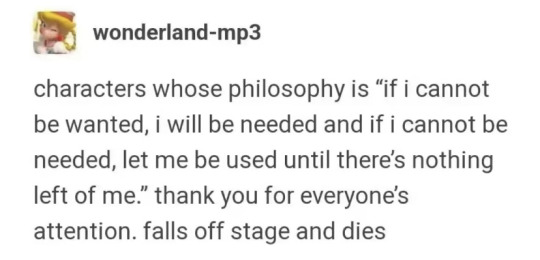
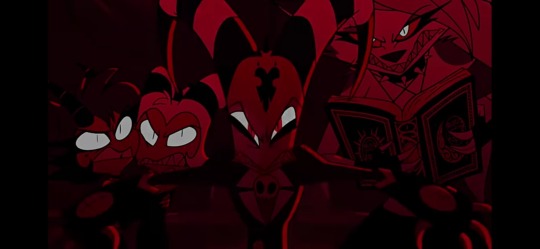
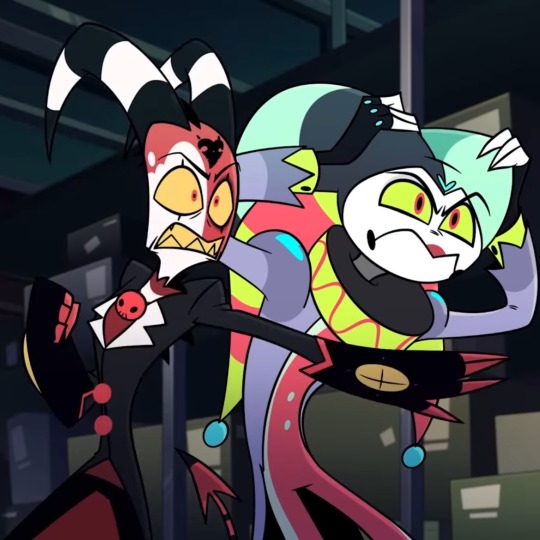
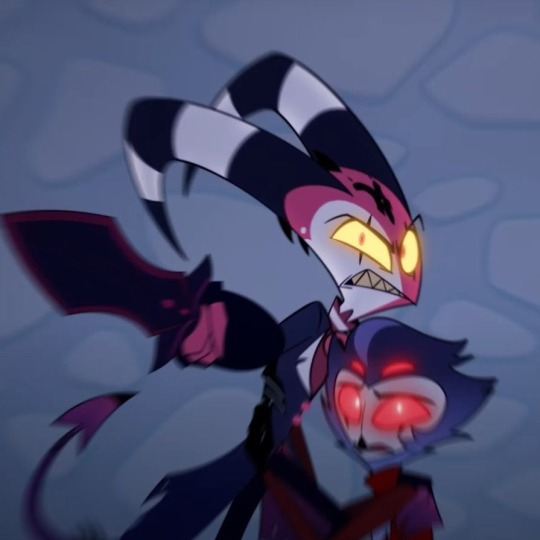
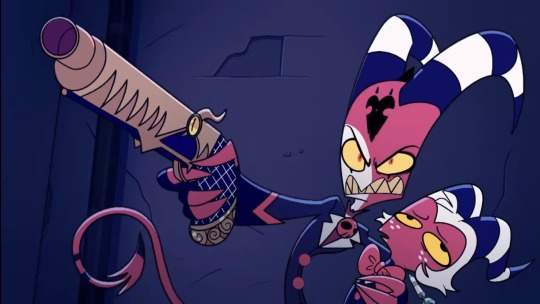
Blitzøs entire life spent being unwanted. So he adapted, and learned how to be something needed, something to be used.
Which is why I think he firmly believes he is being used by Stolas. He simply cannot fathom a different reality, one in which he is wanted for once in his life.
#if you get it you get it#I don’t understand how Blitzo haters don’t get it#he’s complex and he fucks up but it’s because he cannot fathom being genuinely wanted and loved by someone#since he has never felt genuinely loved or wanted#and the few people who maybe made him feel that way#he ruined their lives#I’m writing a fanfic currently with this concept if anyone’s interested lmao#stolitz#helluva boss#stolas#blitzo#hellaverse#helluva blitzo#helluva boss blitz#helluva boss trailer#blitzo x stolas#hazbin hotel#imp#imp helluva boss#blitzo buckzo#protective blitz#protective blitzo
9K notes
·
View notes
Text
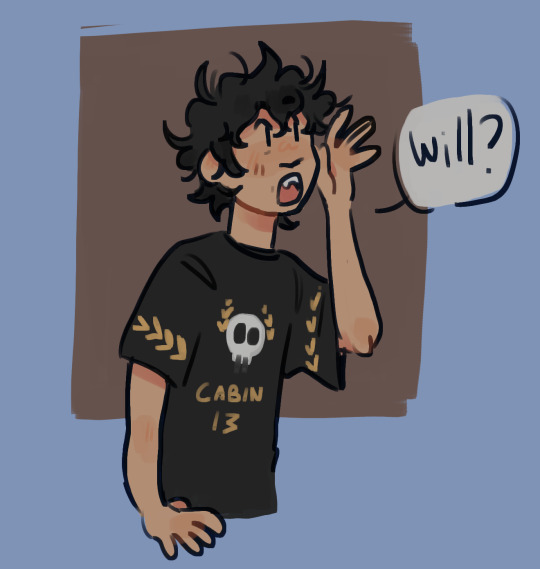

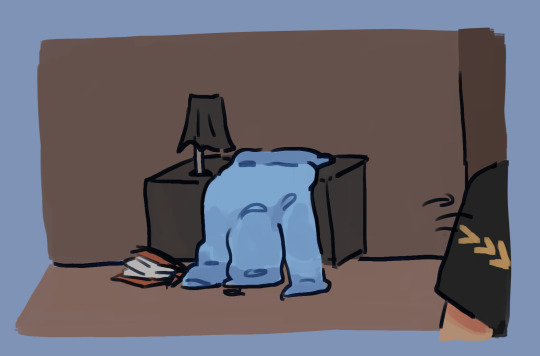
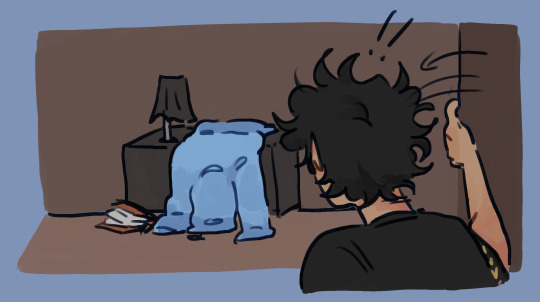

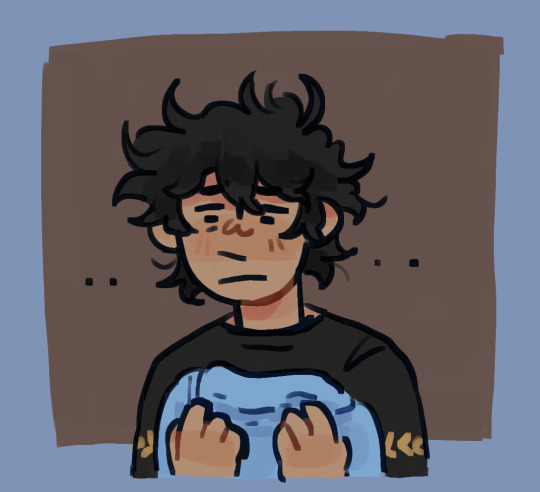
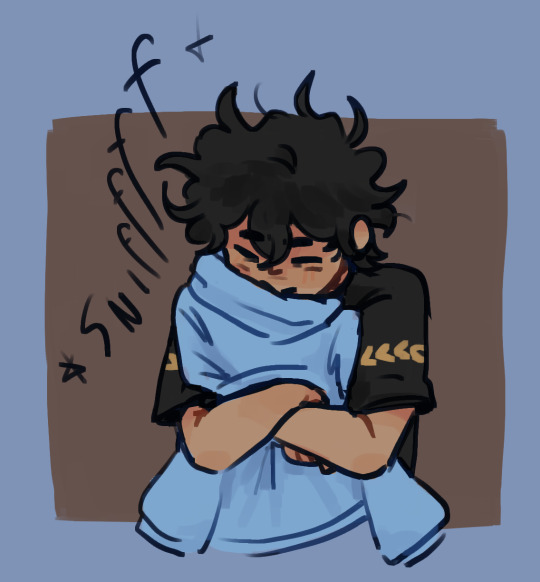
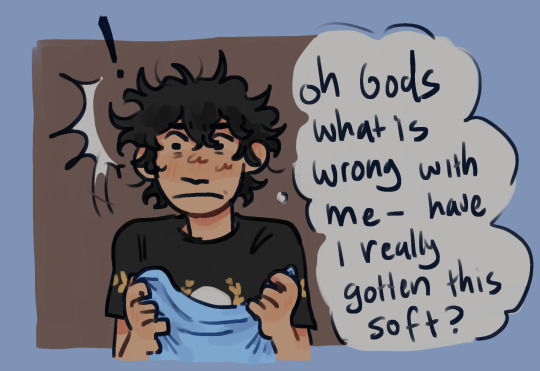


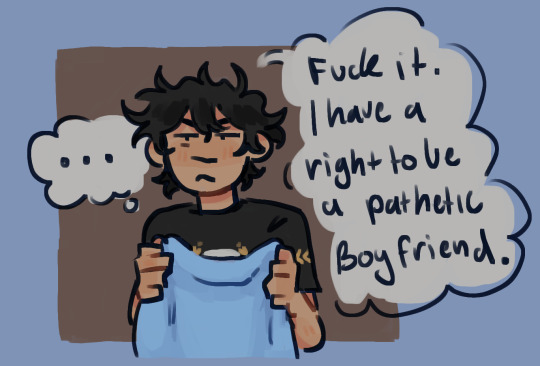


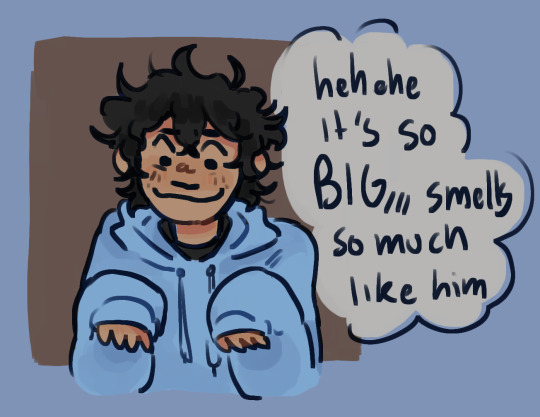
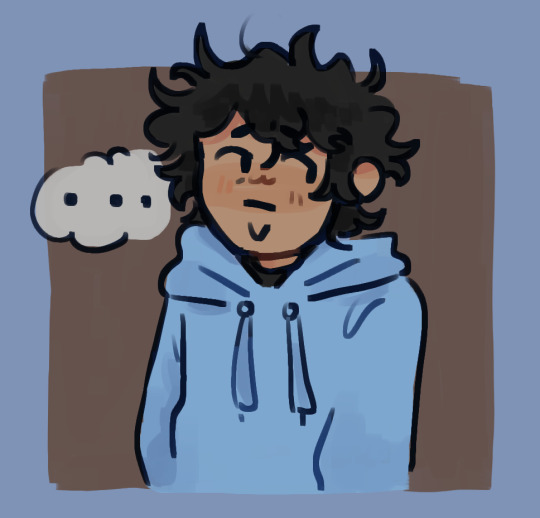

thinking about Nico adjusting to letting himself miss and long for the people he loves.
based on these bits from the sun and the star:
" As Nico and Will followed the trogs, he thought about how much he missed Hazel. He was learning to make peace with that feeling. It was okay for him to miss people because that meant he wanted them around in his life. That idea was *very* new for him- he was used to either pushing people away or watching them recoil from his presence."
*
" That was the most surreal thing of all... Was he happy?
Nico wasn't very familiar with the sensation, but he couldn't deny that he felt wonderful in Will's presence. He even longed for the son of Apollo when they were apart. A funny thing had happened as the two grew closer: Nico suddenly understood all those cheesy, sappy love songs he'd always hated."
#its just. i like that they included that in the book yk. the fact that he prepared a certain distance between everyone#and thus isnt used to missing anyone#so its strange for him#this is probably set somewhere pre tsats just because i like to think it was one of the times he found himself missing and longing.#but it was one of the first times he actually allowed himself to feel that way.#took the feeling and held it instead of banishing it away#also yes letting himself unmask a bit#i like to think he just gets wayyy more expressive with his hands the more he heals#that and he unmasks more!!! more openly stimming!! more special interest rambles!!#just oughh.#anyways this was a huge comic to colour#big fuck you to tumblr who made posting soooo much harder#fuck u and ur updates tumblr#solangelo#pjo#percy jackson and the olympians#percy jackon and the olympians#nico di angelo#will solace#the sun and the star#trials of apollo#they borrow clothes from eachother its real in my head okay#nico canonally bought will a stupid shirt as a joke tho and i love that for them
4K notes
·
View notes
Text
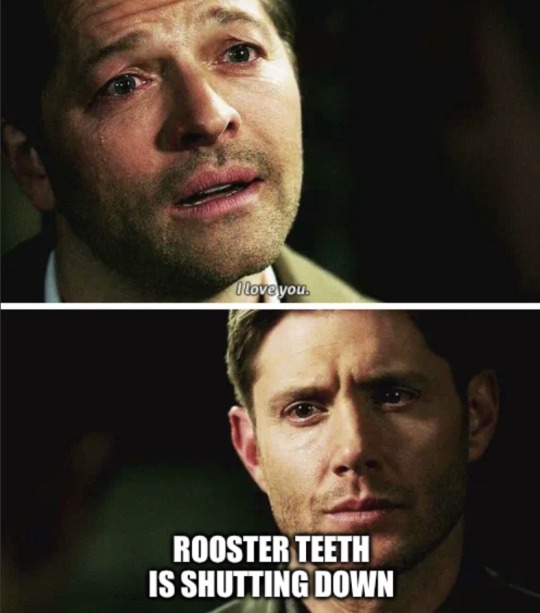
well….it finally happened
#rip rt#the good times were certainly good <3#rt#roosterteeth#rooster teeth#honestly this is how i’m finding out it was officialy rooster teeth and not one word#if anyone doesn’t read the article but reads my tags (??) it looks like only the podcasts are carrying on for the time being#they’re shopping around rwby and shows like that and the roost which is the podcast side of things but otherwise#also apparently there’ll be a stream on the rt site tomorrow talking about it if anyone is interested#idk this sucks#be good to the people who were still there they deserve it#warner media on the other hand…..rot <3
4K notes
·
View notes
Text
also in regards to that last article about varied ways of thinking about psychosis/altered states that don't just align with medical model or carceral psychiatry---I always love sharing about Bethel House and their practices of peer support for schizophrenia that are founded on something called tojisha kenkyu, but I don't see it mentioned as often as things like HVN and Soteria House.

ID: [A colorful digital drawing of a group of people having a meeting inside a house while it snows outside.]
"What really set the stage for tōjisha-kenkyū were two social movements started by those with disabilities. In the 1950s, a new disability movement was burgeoning in Japan, but it wasn’t until the 1970s that those with physical disabilities, such as cerebral palsy, began to advocate for themselves more actively as tōjisha. For those in this movement, their disability is visible. They know where their discomfort comes from, why they are discriminated against, and in what ways they need society to change. Their movement had a clear sense of purpose: make society accommodate the needs of people with disabilities. Around the same time, during the 1970s, a second movement was started by those with mental health issues, such as addiction (particularly alcohol misuse) and schizophrenia. Their disabilities are not always visible. People in this second movement may not have always known they had a disability and, even after they identify their problems, they may remain uncertain about the nature of their disability. Unlike those with physical and visible disabilities, this second group of tōjisha were not always sure how to advocate for themselves as members of society. They didn’t know what they wanted and needed from society. This knowing required new kinds of self-knowledge.
As the story goes, tōjisha-kenkyū emerged in the Japanese fishing town of Urakawa in southern Hokkaido in the early 2000s. It began in the 1980s when locals who had been diagnosed with psychiatric disorders created a peer-support group in a run-down church, which was renamed ‘Bethel House’. The establishment of Bethel House (or just Bethel) was also aided by the maverick psychiatrist Toshiaki Kawamura and an innovative social worker named Ikuyoshi Mukaiyachi. From the start, Bethel embodied the experimental spirit that followed the ‘antipsychiatry’ movement in Japan, which proposed ideas for how psychiatry might be done differently, without relying only on diagnostic manuals and experts. But finding new methods was incredibly difficult and, in the early days of Bethel, both staff and members often struggled with a recurring problem: how is it possible to get beyond traditional psychiatric treatments when someone is still being tormented by their disabling symptoms? Tōjisha-kenkyū was born directly out of a desperate search for answers.
In the early 2000s, one of Bethel’s members with schizophrenia was struggling to understand who he was and why he acted the way he did. This struggle had become urgent after he had set his own home on fire in a fit of anger. In the aftermath, he was overwhelmed and desperate. At his wits’ end about how to help, Mukaiyachi asked him if perhaps he wanted to kenkyū (to ‘study’ or ‘research’) himself so he could understand his problems and find a better way to cope with his illness. Apparently, the term ‘kenkyū’ had an immediate appeal, and others at Bethel began to adopt it, too – especially those with serious mental health problems who were constantly urged to think about (and apologise) for who they were and how they behaved. Instead of being passive ‘patients’ who felt they needed to keep their heads down and be ashamed for acting differently, they could now become active ‘researchers’ of their own ailments. Tōjisha-kenkyū allowed these people to deny labels such as ‘victim’, ‘patient’ or ‘minority’, and to reclaim their agency.
Tōjisha-kenkyū is based on a simple idea. Humans have long shared their troubles so that others can empathise and offer wisdom about how to solve problems. Yet the experience of mental illness is often accompanied by an absence of collective sharing and problem-solving. Mental health issues are treated like shameful secrets that must be hidden, remain unspoken, and dealt with in private. This creates confused and lonely people, who can only be ‘saved’ by the top-down knowledge of expert psychiatrists. Tōjisha-kenkyū simply encourages people to ‘study’ their own problems, and to investigate patterns and solutions in the writing and testimonies of fellow tōjisha.
Self-reflection is at the heart of this practice. Tōjisha-kenkyū incorporates various forms of reflection developed in clinical methods, such as social skills training and cognitive behavioural therapy, but the reflections of a tōjisha don’t begin and end at the individual. Instead, self-reflection is always shared, becoming a form of knowledge that can be communally reflected upon and improved. At Bethel House, members found it liberating that they could define themselves as ‘producers’ of a new form of knowledge, just like the doctors and scientists who diagnosed and studied them in hospital wards. The experiential knowledge of Bethel members now forms the basis of an open and shared public domain of collective knowledge about mental health, one distributed through books, newspaper articles, documentaries and social media.
Tōjisha-kenkyū quickly caught on, making Bethel House a site of pilgrimage for those seeking alternatives to traditional psychiatry. Eventually, a café was opened, public lectures and events were held, and even merchandise (including T-shirts depicting members’ hallucinations) was sold to help support the project. Bethel won further fame when their ‘Hallucination and Delusion Grand Prix’ was aired on national television in Japan. At these events, people in Urakawa are invited to listen and laugh alongside Bethel members who share stories of their hallucinations and delusions. Afterwards, the audience votes to decide who should win first prize for the most hilarious or moving account. One previous winner told a story about a failed journey into the mountains to ride a UFO and ‘save the world’ (it failed because other Bethel members convinced him he needed a licence to ride a UFO, which he didn’t have). Another winner told a story about living in a public restroom at a train station for four days to respect the orders of an auditory hallucination. Tōjisha-kenkyū received further interest, in and outside Japan, when the American anthropologist Karen Nakamura wrote A Disability of the Soul: An Ethnography of Schizophrenia and Mental Illness in Contemporary Japan (2013), a detailed and moving account of life at Bethel House. "
-Japan's Radical Alternative to Psychiatric Diagnosis by Satsuki Ayaya and Junko Kitanaka
#personal#psych abolition#mad liberation#psychosis#altered states#antipsych#antipsychiatry#mad pride#peer support#schizophrenia#i have a pdf of the book somewhere if anyone wants#the book and the documentary also discuss some of the pratical struggles in creating a community like this which i also found helpful as#someone who is very interested in helping open a peer respite.
2K notes
·
View notes
Text

#slay the princess#I know this is out of nowhere but-#Sorry someone just sent me a crazy take and this is the only way to cope.#Reminder! The devs themselves said that they see all endings as canon!#Do not send authors messages if their fic/interpretation/posts did not align with your canon!#Fun fact! I only became interested in this game *because* the devs said that#So people saying that that interpretation is wrong… kind of rub me the wring way.#So just to confirm:#Saying you interpreted the game's relationship as romantic and healthy: Cool#Saying anyone who interprets the game any other way is wrong: Not Cool#meme
1K notes
·
View notes
Text
"Is it true that you and Harrington are friends now?"
Steve paused outside the drama class' door and lowered the hand that was about to push it open. He didn't expect to eavesdrop when he came back to retrieve his jacket, but he decided to make an exception because those people were clearly talking about him behind his back even when it was in the form of drilling Eddie about their sudden friendship.
And Eddie's friends were right to be suspicious about it. Because had it not been for the Upside Down, the two of them wouldn't have become close at all. Or maybe, they would eventually with their shared custody of the kids. But he was well aware that Eddie was too cool to be seen with a failure like Steve Harrington.
Without the shared traumas, they had nothing in common. And sometimes, he thought Eddie only saw him as an inconvenient cousin that he hated but had to tolerate for the sake of their family.
It hurt to think like that, but every time Eddie blushed and stammered in embarrassment when someone asked about him, Steve couldn't help but believe it was true.
So now, he wanted to know what Eddie's answer would be without him there. If Eddie had been genuine about being his friend this whole time or if Eddie would scoff and prove his worst fear right.
"Yeah, Eddie, what's the deal with Harrington? Has he been bothering you or something?"
Steve grimaced. Had he been such a douche in high school that everyone would always assume the worst of him even now?
"Nah, he's really sweet once you get to know him," Eddie chuckled, sounding fond and warm. "He's a good guy. And the world's best mom, apparently. Like I already knew our sheepies worship the ground he walks on, but I only understood why it's clearly a given when I finally met him. He's just... incredible, man."
Steve's cheeks burned at the transparent affection in Eddie's voice. He could see the way Eddie pulled a strand of hair to hide his blush behind it. God, he was a bad friend for doubting Eddie in the first place.
"Gross, you sound lovesick, dude."
"That's homophobic, man."
"You know what I mean. So it's true that you're friends with Harrington."
There was a pause and Steve felt his stomach roll with nerve. Despite having known where Eddie's loyalty lied, he still waited with bated breath.
"We're boyfriends, actually," Eddie said calmly.
As the others erupted in surprised noises, Steve blinked owlishly and walked away, forgetting about his jacket. He had so many questions right now, but first:
When did he and Eddie start dating?
#steddie#steve harrington#eddie munson#oblivious steve harrington#steve wondered why no one seemed interested in him anymore#he didn't know eddie had been going around telling people they were dating this whole time#and would threaten anyone who dared to flirt with him#steve: and when did i agree to go out with you?#eddie: i asked you if you wanna be kidnapped by me and you said yes?#sionewrites
2K notes
·
View notes
Text
Sobbing uncontrollably reading through a dissertation about the college experience of students with ADHD. It is like reading a report about my life that just says over and over "My experiences are real. My hardships are real. I am not lazy, I am not dumb. My struggles were not my fault, and they were not a moral failing. The failure was with the system, not with me."
Here's a line that got me in particular:
"Hotez et al.(2022) compared the health, academic, and non-academic capacities of a nationally representative sample of U.S. first-year college students with ADHD and without ADHD. Students with ADHD self-reported lower academic aspirations and more feelings of depression and overwhelm, ranking themselves lower in their general emotional health. The fact that students with ADHD scored in the highest 10th percentile for many non-academic traits, such as artistic ability, computer skills, creativity, public speaking, social confidence, self-understanding and understanding of others, compassion, and risk-tasking, suggests that this population has strengths that are frequently underappreciated in academia."
(the paper is a thesis called "Understanding the Collegiate Experience for Students With ADHD" by Gia Long, 2022)
#adhd#actually adhd#i often hyperbolize but i am dead serious when i say sobbing uncontrollably. this is why i was putting off this assignment.#1000 years of hell to professors who assign self-reflection papers /hj#i dont feel comfy posting the pdf bc its not mine butttt.. i will share it to people who dm me.#edit: pages 80-85#edit: thank you to everyone who reached out and asked for the pdf!! i wasn’t expecting this reaction#keep reaching out I’ll keep sending it#if anyone is interested but struggles to read academic papers pls ask me for help bc I’ve gotten a lot of practice with them and am Glad to#expand someone’s access to a paper like this
4K notes
·
View notes
Text

Brand new God
#this is actually a character who I put a lot of thought into design-wise and is something I'm very attached to#I can ramble about it if anyone is interested#characters
1K notes
·
View notes
Text
Pspspsps ohhh you wanna be a tag wrangler so bad recruitment is open
#egg speaks#ao3 blogging#if anyone who follows me wants to know what it is like pls ask#i am cheering for certain fandoms on this list#i wrangle one but i will not disclose that publicly#iso new wrangler for 3 yrs ayooo#but no srsly#interested? i have information and propaganda
1K notes
·
View notes